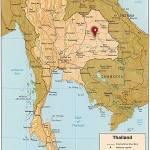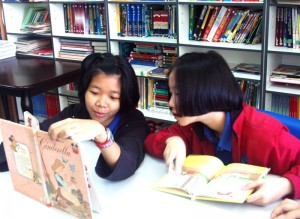 A few weeks ago I received a contact from the Minnov8 site. The woman who wrote it (Lynn Brown) teaches at a school in Thailand in a program featuring English as a second language. They desperately need books in English for their tiny library and they have no funds for the books or for shipping.
A few weeks ago I received a contact from the Minnov8 site. The woman who wrote it (Lynn Brown) teaches at a school in Thailand in a program featuring English as a second language. They desperately need books in English for their tiny library and they have no funds for the books or for shipping.
Can you help with books?
I’ve never been to Thailand, but because my wife has put on workshops for Thailand’s Department of Export Promotion three different times, I’ve met many of her contacts from Thailand (and their kids) and they are incredibly delightful people. My bride has also told me so many stories about the country, its people, and how she loves them so much she’d move there, I was very receptive to Lynn’s request to help gather books for her students.
The Thailand school Strisuksa (Stree-suk-sah) is located in a province called Roi Et. It is relatively far from Bangkok—which means they are internet-challenged as you’ll read about below—but they have a student group who will be visiting MN in October (arriving late in the week of October 3rd) and will be at Cambridge-Isanti High School in Cambridge, MN . Each student will be allowed 2 pieces of checked luggage. They hope to make the most of that luggage allowance by returning with books for their library.
If you have any ideas (or books!) that might help them gather up English books suitable for 7-9th graders and then upper secondary (10th-12th grade)—and let me know where we can pick them up—that would be terrific! Contact me, Steve Borsch, by email or by phone at 952.232.5040. I will compile a list of those who have helped and publish it here on Minnov8.
Below I go through more information about the school, student learning in English there, and what Minnov8 is doing to help.
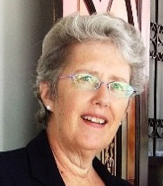
Lynn Brown
What Minnov8 is Doing
Besides contacting multiple organizations about them possibly donating English books suitable for 7th through 12th graders learning English, the school also doesn’t enjoy fast internet access which is similar to much of Thailand outside of major urban centers. During our discussions, I pointed Lynn to Project Gutenberg, an online compilation of classic books (many with accompanying audio books for many of them). Lynn was intrigued and she, and another English teacher in the school, compiled their wish-list for me, but Lynn then was lamenting the fact that they’d never be able to download them at the school since the connections are far too slow.
As a consequence, Tim Elliott and I will be taking their desired list of 100 titles from Project Gutenberg, and burning them to CD for them to take back to Thailand and make available throughout the school. We’ll be meeting with Lynn Brown late in the week of October 3rd to give her the CDs and arrange for the books to be delivered to her students with empty suitcases.
More Info from Lynn Brown
The town population is roughly 36,000, with a total of 1.2 million or more in the province. The town of Roi Et has 4 major secondary schools, of which we are the second largest with an enrollment of 4,300. Although originally opened in 1917 as a girl’s school, it is now co-educational, however girls continue to outnumber boys. The largest school in town is the boys school, also co-educational. Both schools maintain such high enrollment figures because students come from all over the province and board in town. Many people feel the quality of education is much better at these two larger schools.
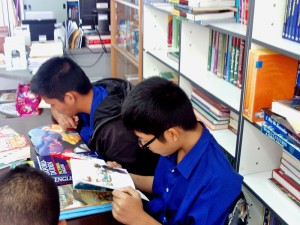
I started teaching at Strisuksa in the first year of the program. At that time, the library consisted of one book case in the teacher’s office / lounge and held about 100 books. The second year we were able to obtain a bit more space and added a second book case, purchased some books and called it a library corner. Next came a small classroom furnished with more bookcases and the real effort to obtain books. We purchased many, and then became aware of the Books for Asia Foundation. A large number of our non-fiction books have come from that source. A second resource was Thailand Book Drive. This foundation was begun in the USA by a young man who knew of the need for English books in rural Thailand. We’ve obtained over 2,000 books from this foundation, and have shared 100’s of surplus books (mainly duplicates) with other schools in the province. ((We feel that others can benefit from the books too, and if we have too many or ones that our students aren’t reading, maybe someone at another school will. We’ve helped at least 4 other secondary schools in this manner.))
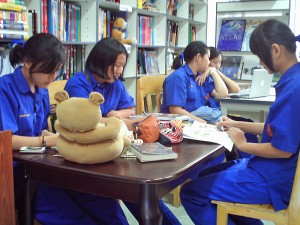
Students in Thailand study in lower (7-9th grades) and upper (10 – 12th) secondary levels for 3 years each. At the conclusion of the lower secondary, they have the option of continuing at their current school or transferring to another. The English Program is offered to students at both the lower and upper levels. The Ministry of Education Thailand has set a limit of 70 students per level in lower secondary for the English Program. We split this to two classrooms of 35 each. The upper secondary is limited to one class of 35 students. We have consistently been receiving applications for many more students than we can accept in the upper level. In the upper level students can choose from a major in Math, Science, or language. In addition to English, they may also choose to study Spanish, Japanese, Chinese, French, or Korean.
The English Program must follow the same core curriculum as all Thai classes. Students receive instruction in Thai and English each day from separate teachers. There are now 12 native English speaking teachers on staff to meet the needs of the classes. The only subjects not being taught in English are Art and Music. We have two English teachers who really encourage the students to read – giving both class and outside reading assignments.
Again, if you can help contact me, Steve Borsch, by email or by phone at 952.232.5040. As mentioned above I will compile a list of those who have helped and publish it here on Minnov8. Thanks!
